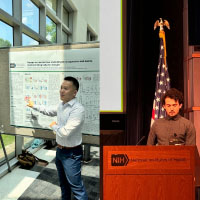Spotlight
Diversity, Equity, Inclusion, and Accessibility Efforts Gain Traction at National Institute on Alcohol Abuse and Alcoholism

A year after the National Institute on Alcohol Abuse and Alcoholism (NIAAA) announced the selection of Dawn Wayman, M.H.S., as the institute’s first Scientific Diversity Officer (SDO), NIAAA continues to advance the principles of diversity, equity, inclusion, and accessibility (DEIA) both internally and in its scientific programs.
As leader of DEIA efforts at NIAAA, Ms. Wayman regularly engages the NIAAA community through a broad array of activities to foster an organizational culture that integrates DEIA into everything it does, from building and enhancing cultural competence across NIAAA, to cultivating a diverse scientific and administrative workforce, to enhancing the NIAAA minority health and health disparities research portfolio.
Recently, NIAAA highlighted its commitment to DEIA through its Strategic Plan for Fiscal Years 2024-2028, which was released in May 2024. Advancing DEIA in the alcohol research enterprise is a crosscutting research theme that is integral to all NIAAA strategic plan goals.
Research suggests that diversity promotes creativity and fosters scientific innovation. Additionally, supporting a diverse workforce that includes historically underrepresented populations enables the research to be informed by a wide range of perspectives and to capitalize on the full range of talent in the nation. A core component of NIAAA’s goal of building a robust research capacity is cultivating and sustaining a highly skilled and diverse scientific and administrative workforce.
To this end, NIAAA is working to expand outreach about NIAAA and National Institutes of Health (NIH) research training programs to diverse communities. By engaging with professional organizations and academic institutions, NIAAA hopes to increase the awareness of alcohol research training opportunities among students and trainees from diverse populations, including training programs within NIAAA’s intramural research program.
NIAAA is also seeking partnerships with Minority Serving Institutions (MSIs). For example, NIAAA’s intramural research program has established a collaboration with Howard University on graduate-level training in basic and clinical research that will serve as a model for future efforts in enhancing diversity in the scientific workforce. NIAAA supports collaborative research and biomedical workforce development partnerships between research centers in MSIs and NIAAA-supported Alcohol Research Centers.
NIAAA also participates in programs led by other NIH Institutes and Centers (IC). One such partnership is the NIH Maximizing Opportunities for Scientific and Academic Independent Careers (MOSAIC) program established and led by the National Institute of General Medical Sciences. MOSAIC facilitates the transition of promising postdoctoral researchers from diverse backgrounds into independent faculty careers. NIAAA participates with other ICs in the NIH Diversity Supplement program, which provides administrative supplements to NIH research grants to support research experiences for individuals from diverse backgrounds across the career development continuum.
“It’s been an exciting year of DEIA work at NIAAA,” said Ms. Wayman. “One of the challenges of DEIA work is that we rarely achieve success overnight. It’s a long and slow process. Yet, I am happy with the gains we are making at NIAAA. We have been very intentional in setting aside the time to assess where we are, identify our gaps, and plan our next steps together. I am confident we will see several of our planning efforts gain traction over the next year.”










